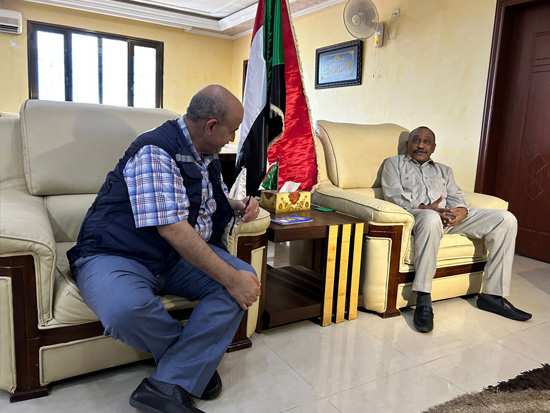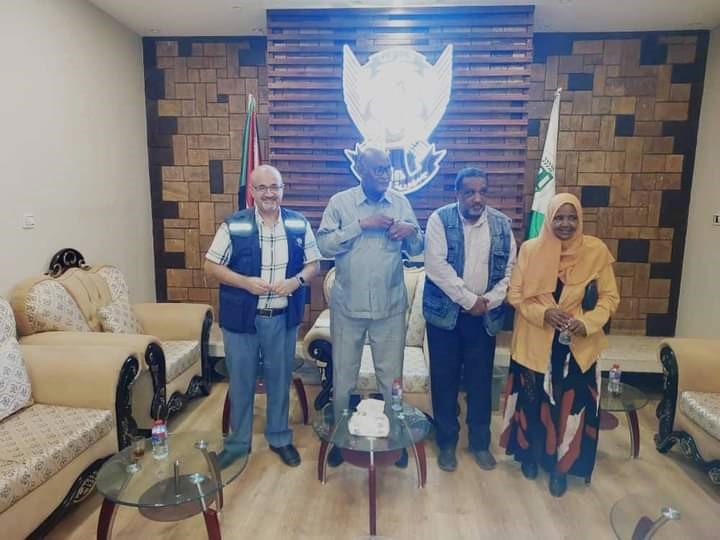Dr Nima Saeed Abid, WHO Representative in Sudan, visited Gedaref, Gezira and Kassala states on 16–20 September 2023 to monitor WHO operations and meet with state health authorities to discuss the public health situation and health emergency response and the status of essential health services.
During his visit, Dr Abid met with high-level government officials, health partners and WHO staff. He reiterated the need for strong coordination and the need to scale up the health emergency response while ensuring continuity of essential health services – including for reproductive health; maternal, newborn, child and adolescent health; routine immunization; and noncommunicable diseases. He also reaffirmed WHO’s commitment to these public health priorities.
Dr Abid met with WHO staff in each state, commending them for their commitment to WHO’s mission. He encouraged them to continue to support health authorities and partners with the same energy and resolve, to ensure a coordinated and effective health emergency response. He also reminded them to adhere to security measures as they deliver on their duties; their safety and well-being is high on WHO’s emergency response agenda.
 Dr Nima Saeed Abid, WHO Representative in Sudan, with some of the WHO staff he met in Gedaref State during his visit in September 2023. Photo credit: WHO Sudan
Dr Nima Saeed Abid, WHO Representative in Sudan, with some of the WHO staff he met in Gedaref State during his visit in September 2023. Photo credit: WHO Sudan
Visit to Gedaref State, 16–18 September 2023
On his arrival in Gedaref State on 16 September 2023, Dr Abid met with Dr Abdul-Nasir Hassan Ali, Director-General of Gedaref State Ministry of Health. The focus of their discussion was the current health emergency, which includes ongoing outbreaks of acute watery diarrhoea/suspected cholera (later confirmed as cholera) and dengue, as well as continuity of essential health services in the state.
Dr Abdul-Nasir said that he appreciated WHO’s response to the complex emergency in Gedaref State and called for even more robust support to the ongoing outbreaks and other health needs on the ground.
 WHO donates beds to a cholera treatment centre in Gedaref State during Dr Abid’s visit. Photo credit: WHO Sudan
WHO donates beds to a cholera treatment centre in Gedaref State during Dr Abid’s visit. Photo credit: WHO Sudan
Dr Abid confirmed WHO’s commitment to providing robust technical and operational support to the health emergency response. “A strong team of WHO experts, including an entomologist, environmental health specialists, surveillance officers and an epidemiologist, was deployed in September to support the outbreak response. We have also provided supplies and equipment for use in the cholera treatment centre in Gedaref,” he said during a visit to the centre. “Additional surge support will be deployed in the coming weeks to strengthen the response.”
He also called for the activation of a public health emergency operations centre to effectively coordinate the response to the ongoing outbreaks in the state.
Dr Abid opened a case management training session organized by WHO and Gedaref State Ministry of Health, at which he underscored the key role of doctors in both educating patients and families and in disease surveillance and alert. He also met with Health Cluster partners, where he emphasized the importance of a multisectoral approach to health emergency response. Particularly in relation to acute watery diarrhoea/suspected cholera, a coordinated case management, nutrition, and water, sanitation and hygiene response is key to saving lives and containing the outbreak.
 Dr Abid opens a case management training session in Gedaref, accompanied by state health officials. Photo credit: WHO Sudan
Dr Abid opens a case management training session in Gedaref, accompanied by state health officials. Photo credit: WHO Sudan
 Members of the audience look on as Dr Abid opens a case management training session in Gedaref, accompanied by state health officials. Photo credit: WHO Sudan
Members of the audience look on as Dr Abid opens a case management training session in Gedaref, accompanied by state health officials. Photo credit: WHO Sudan
Dr Abid also met with WHO staff working in Gedaref State, commending them for their commitment to WHO’s mission. He encouraged them to continue to support health authorities and partners to ensure a coordinated and effective health emergency response. He also reminded them to stay safe as they deliver on their duties.
As he wrapped up his visit to the state, Dr Abid briefed the Governor of Gedaref State, Mr Mohamed Abdelrahman, on his visit. Mr Mohamed acknowledged WHO’s support to the state and thanked Dr Abid for the provision of equipment and supplies to the cholera treatment centre in Gedaref. Dr Abid expressed his appreciation for the state government’s leadership in the health emergency response and reaffirmed WHO’s commitment to continue collaborating with the state to tackle health emergencies such as the suspected cholera cases. He also underscored the need to expedite approval processes for the movement of supplies to enable a swift and effective response to health emergencies and disease outbreaks.
 Dr Abid meets with Mr Mohamed Abdelrahman, Governor of Gedaref State. Photo credit: WHO Sudan
Dr Abid meets with Mr Mohamed Abdelrahman, Governor of Gedaref State. Photo credit: WHO Sudan
A cholera outbreak was declared in Gedaref State on 26 September 2023. WHO has delivered health emergency supplies to Gedaref, including cholera kits that contain intravenous infusions, pain medicines, blood bags and personal protective equipment, plus 40 treatment beds for the management of cholera cases. WHO surveillance and logistics teams have also facilitated the shipment of samples for confirmation of cholera at the Public Health Laboratory in Port Sudan.
WHO will continue to support the shipment of samples to the Public Health Laboratory, and will soon dispatch additional medicines for the management of dengue.
Visit to Gezira State, 18–19 September 2023
In Gezira State, Dr Abid met with Dr Osama Abdelrahman, Director-General of Gezira State Ministry of Health, to discuss the health emergency in the state. The current emergency encompasses an outbreak of dengue, an influx of internally displaced people and a rising number of severe acute malnutrition cases. They also discussed the need to strengthen essential health services.
Dr Osama expressed his appreciation for WHO’s support to the health operations and emergency response in Gezira. He also stated his expectation that WHO’s technical and operational support will continue in future.
 Dr Abid meets with Dr Osama Abdelrahman, Director-General of Gezira State Ministry of Health. Photo credit: WHO Sudan
Dr Abid meets with Dr Osama Abdelrahman, Director-General of Gezira State Ministry of Health. Photo credit: WHO Sudan
Dr Abid visited the dialysis centre in Gezira Hospital for Renal Diseases and Surgery, which is operating in crisis mode. The centre is running 5 shifts per day at full capacity to meet the demand for services, which has increased exponentially since the outbreak of war in Sudan, owing to the displacement of patients and closure of some other dialysis centres.
Dr Abid expressed WHO’s commitment to support dialysis services in the country. This support includes recent donations and efforts to deliver supplies to fill critical gaps in service delivery until the health system can once again sustain itself.
 At Gezira Hospital for Renal Diseases and Surgery, Dr Abid visits the dialysis centre, accompanied by Dr Osama Abdelrahman, Director-General of Gezira State Ministry of Health. Photo credit: WHO Sudan
At Gezira Hospital for Renal Diseases and Surgery, Dr Abid visits the dialysis centre, accompanied by Dr Osama Abdelrahman, Director-General of Gezira State Ministry of Health. Photo credit: WHO Sudan
While in Gezira, Dr Abid met with the medical directors of 7 specialized hospitals that are set to receive WHO support through a partner operating in the area. During the meeting, existing challenges were shared and the way forward discussed. Dr Abid also visited 2 of the hospitals to receive support – the paediatric teaching hospital and a cardiac centre.
 Dr Abid visits a children’s hospital in Wad Madani, Gezira State. Photo credit: WHO Sudan
Dr Abid visits a children’s hospital in Wad Madani, Gezira State. Photo credit: WHO Sudan
With the Director-General of Gezira State Ministry of Health, Dr Abid visited a WHO-supported mobile health clinic in a camp for internally displaced people set up at a school in the district of Baraka. The mobile clinic provides services to displaced people 6 days a week.
Dr Abid also visited a hospital run by the Sudanese American Physicians Association, which is providing free primary health care services to internally displaced people. He observed the need to dispatch WHO supplies to support this service and made a commitment to doing so.
 Dr Abid visits a WHO-supported mobile health clinic for internally displaced people at a camp in Baraka, Gezira. Photo credit: WHO Sudan
Dr Abid visits a WHO-supported mobile health clinic for internally displaced people at a camp in Baraka, Gezira. Photo credit: WHO Sudan
As he wrapped up his visit to the state, Dr Abid briefed the Governor of Gezira State, Mr Ismail Alagib, on his visit. Dr Abid expressed his appreciation for the state government’s leadership in the health emergency response and his hopes for continued collaboration, particularly in expediting approval processes for the movement of supplies.
 Dr Abid meets with Mr Ismail Alagib, Governor of Gezira State. Photo credit: WHO Sudan
Dr Abid meets with Mr Ismail Alagib, Governor of Gezira State. Photo credit: WHO Sudan


